-
Architecture
archive
art
Ballard
body
China
cinema
ecology
education
Europe
Ezra Pound
futurology
gothic
image
law
Literature
London
magic
memory
Modern
Modernism
museums
music
novel
performance
photography
poetry
politics
radical philosophy
science
science fiction
Sinclair
Situationism
sound art
Surrealism
technology
television
the avant-garde
The Future
Theory
thomson
time
Urban
visual culture
war
Posts tagged science fiction
Dr Who’s The War Games, January 22 2014
Tagged as law, science fiction, television
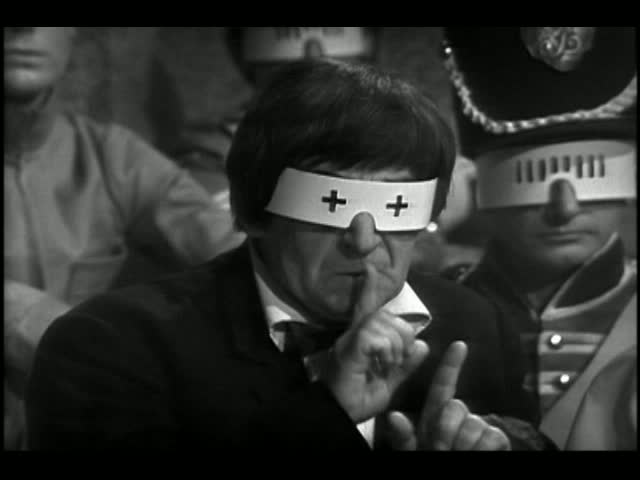
Wednesday 22 January 2014, 2.30-4.30 pm (please note change of time)
Room 2.01, School of Law, Little Titchfield Street
“A turning point for Dr Who: the War Games Revisited”
The seminar will comprise an introduction from Danny Nicol, a screening of the pivotal episode 10 of Dr Who’s The War Games (1969) and will be followed by a discussion.
The Science Fiction Politics of Urban Crisis article
Tagged as cinema, novel, politics, radical philosophy, science fiction, Urban

A new article by David Cunningham and Alex Warwick has just appeared in the most excellent journal CITY, vol. 13, no. 4: ‘Unnoticed Apocalypse: The Science Fiction Politics of Urban Crisis’. The essay ranges over a number of contemporary texts from The Coming Insurrection to Rem Koolhaas’ Junkspace to the film District 9.
The nice people at Taylor & Francis Press are offering the first 50 people to make use of it free access to an eprint version from the following link: http://www.tandfonline.com/eprint/AqbgvrWCkCSXg8XZEwgd/full
English Literature and Culture research seminars Feb-March 2013
Tagged as Architecture, education, London, radical philosophy, science fiction

Here is the list of the next series of English Literature and Culture research seminars taking place this semester. All welcome.
Seminars are fortnightly on Wednesday afternoons, from 4pm to around 5.30pm, and will be held in room 106 in the University’s Wells Street building.
Wednesday 6th February, 4.00pm – 5.15pm (Joint seminar with Westminster School of Law)
Danny Nicol (Westminster School of Law)
‘Legitimacy and Globalised Law in Doctor Who’
Wednesday 20th February, 4.00pm – 5.15pm
Fran Bigman (University of Cambridge)
‘A Bit of Himself: British Male-authored Abortion Narratives from Waste (1907) to Alfie (1966)’
Wednesday 6th March, 4.00pm – 5.15pm
Allan Stoekl (Penn State University / IMCC)
‘Le Corbusier and the Challenge of a Pascalian Technocracy’
Wednesday 20th March, 4.00pm – 5.15pm
Matthew Charles (University of Westminster)
‘Brecht as Educator’
British Science Fiction Film and Television of the 1950s seminar
Tagged as cinema, science fiction, television

Wednesday 17th October, 4.00pm – 5.15pm
Room 106, 32-38 Wells Street, London W1T 3UW
Christopher Daley (University of Westminster)
‘Too many machines’: British Science Fiction Film and Television of the 1950s
In analysing British cinema between 1945 and 1965, Tony Shaw (2001) argues that the influence of American cinema on British audiences was undeniable: ‘Hollywood films dominated the British market from the beginning to the end of the period and not to recognize the potentially significant role American productions had in shaping British perceptions of the Cold War would be misleading’ (p.4). Movies such as The Day the Earth Stood Still (1951), Invasion of the Body Snatchers (1956) and Forbidden Planet (1956) persist as potent symbols of an era which mixed fear of communism and nuclear war with utopian hopes for the technological conquest of other worlds. Whilst the political content of these popular films has been continuously reviewed by critics and scholars alike, the contemporaneous works of British filmmakers has received limited attention. In this paper, I will analyse a series of British films and television programmes which not only challenged or complicated the political content of prominent American SF productions, but crucially, made use of the speculative imagination to reflect upon the state-of-the-nation during a period of rapid technological and social transformation.
Cory Doctorow at University of Westminster, 22nd Feb at 3
Tagged as novel, science fiction, technology, war
Wednesday 22 February at 3pm
2.05A School of Law, 4 Little Titchfield Street, London W1W 7UW
Cory Doctorow
‘There is a war coming: the future regulation of general purpose computation’
Organised by our friends in The Centre for Law, Society and Popular Culture
ALL WELCOME. RSVP Danilo Mandic: danilo.mandic@my.westminster.ac.uk
Cory Doctorow (craphound.com) is a science fiction author, activist, journalist and blogger — the co-editor of Boing Boing (boingboing.net) and the author of Tor Teens/HarperCollins UK novels like FOR THE WIN and the bestselling LITTLE BROTHER. He is the former European director of the Electronic Frontier Foundation and co-founded the UK Open Rights Group. He is the author of Content: Selected Essays on Technology, Creativity, Copyright and the Future of the Future, (2008). Born in Toronto, Canada, he now lives in London. See further, http://craphound.com/bio.php
WESTMINSTER.AC.UK/LAW
Fictions of the Not Yet
Tagged as Literature, novel, science fiction, The Future, time

Wednesday 9 November, 1.15pm – 2.30pm
Room 359, 309 Regent Street, University of Westminster
Caroline Edwards (University of Lincoln)
‘Fictions of the Not Yet’
As the first decade of the twenty-first century comes to a close, there is a growing critical awareness of the current fascination with alternative and future worlds in contemporary British fiction. In addition to the continuing popularity of – and growing scholarly interest in – speculative and genre works, an emerging body of “literary” fictions is revealing a wide-ranging preoccupation with narratives of apocalypse, transmigration and haunting. Writers like David Mitchell, Jeanette Winterson, Jim Crace, John Burnside, Marina Warner, Maggie Gee, Jon McGregor and Sam Taylor are thus shifting the parameters of realist literary fiction and its generic borrowings, and in the process articulating a shared concern with the question of temporality. We need to develop a new strategy of reading such fictions in order to examine the formal innovations executed by these visions of temporal alterity and futurity. This paper will outline a refunctioning of Ernst Bloch’s category of the “Not Yet” (Noch Nicht) in order to provide a methodological framework that can draw out the distinctly utopian implications that are prevalent in the contemporary British novel. This refunctioning not only reconsiders the relationship between philosophical discourse and narrative imaginaries, but also helps us outline the distinctive structural, thematic and stylistic characteristics shaping an emerging caucus of fictions.
Out of this world, Sept 16 2011
Tagged as Ballard, futurology, science fiction, The Future

Science Fiction Study Day
British Library, London
Friday 16th September 2011, 9.30am – 5.30pm
Both David Cunningham and Chris Daley will be participating in a panel on J.G. Ballard as part of the British Library’s Science Fiction Study Day, accompanying the exhibition Out of this World, on Friday 16th September. Other speakers include Mark Bould, Roger Luckhurst and John Milner.
From utopian to dystopian visions, Futurism to Futurology, the participants will talk about recent projects that feature various aspects of science fiction discourse. Learn about the most recent research trends, methodologies and applications, and get inspired by the ideas and questions examined during the day.
Details and booking here.
Apocalypse and its Discontents: Programme Announced
Tagged as science fiction, The Future

Westminster English Colloquium #16: Apocalypse and its Discontents
Saturday 11th – Sunday 12th December 2010
The Boardroom, University of Westminster, 309 Regent Street, London
UPDATE: REGISTRATION FOR THIS EVENT IS UNFORTUNATELY NOW CLOSED
The programme for Apocalypse and its Discontents has been announced. See below the line for details.
Admission is free, but to register please send your name, email and affiliation to Monica Germana: m.germana@westminster.ac.uk
Continue reading Apocalypse and its Discontents: Programme Announced
Research Seminar: Martian Astronomy…
Tagged as Literature, science fiction

Wednesday 24 November 2010, 1.15-2.30pm
Room 106, University of Westminster, 32-38 Wells Street, London W1T 3UW
Martin Willis (University of Glamorgan)
‘Martian Astronomy and Popular Fiction’
Further details on the English Literature and Culture research seminar series here.
The Apocalypse and its Discontents: Registration Now Open
Tagged as science fiction, The Future, time

Westminster English Colloquium #16: Apocalypse and its Discontents
Saturday 11th – Sunday 12th December 2010
The Boardroom, University of Westminster, 309 Regent Street, London
UPDATE: REGISTRATION FOR THIS EVENT IS UNFORTUNATELY NOW CLOSED
Registration is now open for the Apocalypse and its Discontents conference. Admission is free, but please send your name, email and affiliation to Monica Germana so as to give her an idea of numbers: m.germana@westminster.ac.uk
Keynote Speakers:
John R. Hall (University of California, Davis)
Adam Roberts (Royal Holloway)
Pat Wheeler (Hertfordshire)
Science Fiction and Mass Observation
Tagged as Literature, Modernism, novel, science fiction
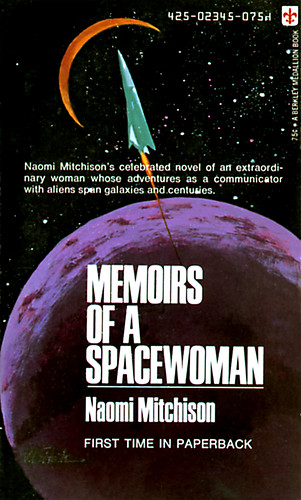
Wednesday 27th October, 1.15-2.30pm
Room 106, University of Westminster, 32-38 Wells Street, W1T 3UW
Nick Hubble (Brunel University)
‘Naomi Mitchison: From Intermodernism to Science Fiction (via Mass-Observation)’
From her 1920s novels, influenced by Lawrence but aimed at the audience of Wells, to her subsequent deployment of modernist techniques for political ends, Naomi Mitchison may be considered a key intermodern writer. Her relentless pursuit of the ‘just society’, free from gender-based and sexual repression, made her a controversial figure even in that controversial decade. And her close literary associates of that decade – including Auden, Aldous Huxley, Olaf Stapledon, Stevie Smith, Wyndham Lewis and Walter Greenwood – suggest different ways of thinking about literary networks and cultural history in general. She was also a friend and supporter of Tom Harrison and Mass-Observation, for whom she kept a wartime diary. Nick Hubble’s paper analyses this intermodern work and investigates how it relates to Memoirs of a Spacewoman (1962), a forerunner of the 1970s feminist utopian science fiction of writers such as Ursula Le Guin, Marge Piercy and Joanna Russ.
Rescheduled from last semester. Further details here.
Apocalypse and its Discontents conference: update
Tagged as ecology, Modern, science fiction, time

Westminster English Colloquium #16: Apocalypse and its Discontents
Saturday 11th – Sundary 12th December 2010
The Boardroom, University of Westminster, 309 Regent Street, London
Keynote Speakers:
John R. Hall (University of California, Davis)
Adam Roberts (Royal Holloway)
Pat Wheeler (Hertfordshire)
While visions of destruction and fantasies of the end have always haunted humankind, the modern period has been characterised by a particularly intense sense of concern and fascination with the apocalypse, especially during the twentieth century. Today we are surrounded by scenarios of imminent destruction and annihilation from politicians, scientists, religious groups, and writers, among others. This conference aims to explore and question the widespread appeal of the apocalypse, as well as to consider narratives that either challenge or offer alternative responses.
Admission is free, but please send your name, email and affiliation to Monica Germana so as to give her an idea of numbers: m.germana@westminster.ac.uk
Apocalypse and its Discontents: Call for Papers
Tagged as apocalypse, science fiction, technology, The Future
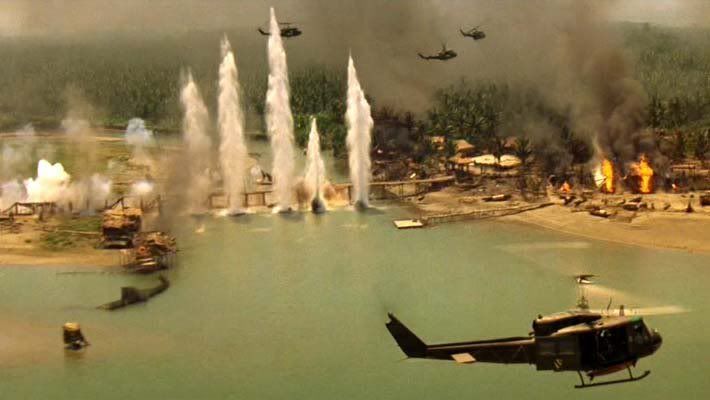
Westminster English Colloquium #16: Apocalypse and its Discontents
Saturday 11th December 2010, University of Westminster, London
Keynote Speaker: Professor Adam Roberts (Royal Holloway)
Whereas visions of destruction and fantasies of the end have always haunted humankind, the modern period in particular has been increasingly characterised by a mixed sense of concern and fascination with the apocalypse, and even more so during the twentieth century. Today we are surrounded by scenarios of imminent destruction and annihilation, by politicians, scientists, religious groups, and writers, among others. This conference aims to explore and question the widespread appeal of the apocalypse. We are particularly interested in narratives that either challenge or offer alternative responses to apocalypse.
The organisers are seeking interdisciplinary papers exploring cultural responses to apocalypse, its discourses and counter-discourses. Topics may include (but are not restricted to): Anti-Apocalypse, Counter-Apocalypse, Ironic Apocalypse; Utopia, Redemption and Rebirth; Commodifying the Apocalypse; Death Tourism and Disaster Capitalism; Media Events theory: Disaster and the Media; Apocalypse and Everyday Life; The Age of Terror; Global Warming and Its Denial; Disaster Fiction/Movie; History as Apocalypse; Trauma theory; Viral Terrorism; Endings and Aftermaths; 2012; Technology and Mass Destruction.
Please email 500-word abstracts and brief bio to all conference organisers by 1 September 2010:
Monica Germanà: m.germana@westminster.ac.uk
Aris Mousoutzanis: a.mousoutzanis@kingston.ac.uk
Christopher Daley: c.daley@my.westminster.ac.uk
From Intermodernism to Science Fiction
Tagged as feminism, Modernism, science fiction

Wednesday 14th April, 1.15-2.30pm
Room 106, University of Westminster, 32-38 Wells Street, W1T 3UW
Nick Hubble (Brunel University)
‘Naomi Mitchison: From Intermodernism to Science Fiction (via Mass-Observation)’
From her 1920s novels, influenced by Lawrence but aimed at the audience of Wells, to her subsequent deployment of modernist techniques for political ends, Naomi Mitchison may be considered a key intermodern writer. Her literary output during the 1930s – The Corn King and the Spring Queen (1931), Beyond This Limit (1934; a feminist fantasy illustrated by Wyndham Lewis), We Have Been Warned (1935), The Moral Basis of Politics (1938) and The Blood of the Martyrs (1939) – is comparable with Orwell’s. Her relentless pursuit of the ‘just society’, free from gender-based and sexual repression, made her a controversial figure even in that controversial decade. And her close literary associates of that decade – including Auden, Aldous Huxley, Olaf Stapledon, Stevie Smith, Wyndham Lewis and Walter Greenwood – suggest different ways of thinking about literary networks and cultural history in general. She was also a friend and supporter of Tom Harrisson and Mass-Observation, for whom she kept a wartime diary. Nick Hubble’s paper analyses this intermodern work and investigates how it relates to Memoirs of a Spacewoman (1962), a forerunner of the 1970s feminist utopian science fiction of writers such as Ursula Le Guin, Marge Piercy and Joanna Russ.
Free to all.
The Future Papers, Part Three: Stephen Melville
Tagged as art, science fiction, The Future

The third and final part in a short selection of transcriptions of talks from the recent series on ‘The Future’ at the David Roberts Art Foundation. Here’s Stephen Melville’s paper, which constituted a fitting finale to the series. Is the future now?
4. The Future is Now, Now is the Future
Stephen Melville
The two earlier discussions in this series that I was able to attend both seemed to turn quite strongly on a contrast between modern and postmodern representations of the future, more or less as they appear to line up with the contrast between so-called Golden Age and New Wave science fiction. It’s been hard for me, at least, not to hear bits of Beckett stammering in the background, so I was happy to hear Krapp’s Last Tape surface briefly on Saturday. The overall contrast seemed, roughly, one between a future fully distinct from the present and underwritten by a certain faith in science, and a future underwritten by technology and threatened with imminent collapse into the present (or, as one speaker put it, having the shape of an endless intensification of the present) – thus tending also toward a contrast between the utopian and the simulacral, as well as between progress and repetition, and – at least I’ve tried to suggest this – between a certain assumption of shared human being or community and a skepticism about other minds registered, among other places, in a shift in the understanding of the material basis or medium specificity of film from a photographic practice to a form of animation. This last maybe permits an expansion of the postmodern/New Wave text to take account of our apparent current interest in various forms of the undead, and most notably the emergence of the postmodern speed zombie. Neither of these representations seems satisfactory: the Golden Age is, as it were, too much future and in that sense doomed to fail, while the New Wave seems finally not a future at all. Both politics and religion have remained for the most part discreetly in the background, especially religion – which is odd to the extent that one of our continuing interests in the future is, I think, broadly redemptive (certainly notions of apocalypse and the post-apocalyptic, of things more or less shaped like the end of history or the end of the world have put in appearances). It’s perhaps worth opening the contrast a little further off its native ground by taking note of the evident difference between a modern stock market in which one invests for a future that must be awaited, and a postmodern stock market in which futures themselves become a primary commodity and one dreams – sometimes of course in real money – of a present profit made by strip-mining the contingency of the future. Our moment seems to be one that wants to read the phrase ‘the future is now’ – a phrase that I think goes back to the 1950s as a way of naming the new marvels of the present – as ‘now is the future,’ thus as a promise of no more marvels.
Continue reading The Future Papers, Part Three: Stephen Melville
No future
Tagged as science fiction, The Future, Theory
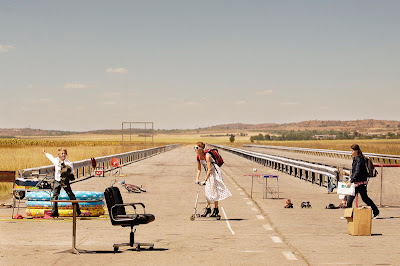.jpg)
The final event in the series on The Future at the David Roberts Art Foundation took place last Thursday, ending with a bang not a whimper. Presentations from Garin Dowd, IMCC affiliate Stephen Melville, and last minute guest Alev Adil covered Derrida and Deleuze, Beckett and Ballard, and resulted in a fiesty discussion about Thierry Henry‘s already infamous handball, as well as the dystopian/utopian virtues of Kraftwerk. We hope to post a selection of some of the papers from the series on this site soon.
The Future as it happened
Tagged as Ballard, science fiction, The Future
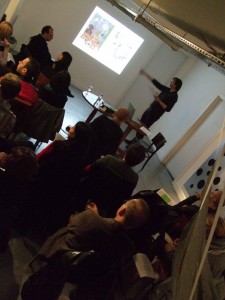
The first in the IMCC’s series of events on The Future at the David Roberts Art Foundation took place on November 5th, with talks on, among other topics, J.G. Ballard, imaging climate change, William Gibson and the 1956 This is Tomorrow exhibition leading to a vigorous discussion of science fiction and environmental politics. The next event is on November 12th, when susan pui san lok, Uriel Orlow, Sally O’Reilly and Niru Ratnam will debate whether ‘The Future is History’.


The Institute for Modern and Contemporary Culture
University of Westminster Department of English, Linguistics and Cultural Studies
32-38 Wells Street, London W1T 3UW. United Kingdom.
